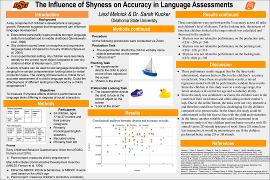| dc.contributor.advisor | Kucker, Sarah | |
| dc.contributor.author | Melnick, Liesl | |
| dc.contributor.other | Wentz Research Scholars | |
| dc.date.accessioned | 2021-05-25T18:58:19Z | |
| dc.date.available | 2021-05-25T18:58:19Z | |
| dc.date.issued | 2021-04 | |
| dc.identifier | oksd_Wentz_2021_melnick | |
| dc.identifier.citation | Melnick, L., & Kucker, S. (2021, April). The influence of shyness on accuracy in language assessments. Poster session presented at the Oklahoma State University Wentz Research Scholars Symposium, Stillwater, OK. | |
| dc.identifier.uri | https://hdl.handle.net/11244/329866 | |
| dc.description.abstract | A key component of children’s development is language growth. Past research demonstrates that individual differences in a child’s temperament influences their language acquisition (Bloom et al. 1988). To capture language development, a variety of methods can be used, and each method differs in the level of sociability required between the experimenter and participant. Importantly, children also vary in their level of shyness and extraversion. Past research suggests that less sociable (more shy) children have smaller vocabularies, while children who are more extraverted tend to express stronger language skills (Usai et al 2009). The objective of this study is to examine if a child's individual temperament affects their performance on language tasks with differing modes of presentation (varying degrees of social interaction). 34 children, ages 17-to-37 months participated in three language tasks administered via Zoom. Each task aimed to measure their vocabulary but varied in social elements; a production task, pointing task, and preferential looking task. Parents also completed a questionnaire for their child regarding their temperament (ECBQ, Putnam et al 2010). For the preliminary analysis, three correlational analyses were run between the % accuracy on each task and the level of shyness of each child. These results demonstrated no significant relationship between shyness and accuracy. A mixed model regression with fixed effects of temperament, mode of presentation, and a random effect of participants will be used to analyze the data after data collection is complete. In conclusion, shyness did not negatively affect children’s ability to perform accurately on each task, at least as demonstrated in the preliminary analysis. Future directions of the project include running the experiment in-person and using 3D and 2D stimuli. | |
| dc.description.sponsorship | Lew Wentz Foundation | |
| dc.format | application/pdf | |
| dc.language | en_US | |
| dc.publisher | Oklahoma State University | |
| dc.rights | In the Oklahoma State University Library's institutional repository this paper is made available through the open access principles and the terms of agreement/consent between the author(s) and the publisher. The permission policy on the use, reproduction or distribution of the article falls under fair use for educational, scholarship, and research purposes. Contact Digital Resources and Discovery Services at lib-dls@okstate.edu or 405-744-9161 for further information. | |
| dc.title | Influence of shyness on accuracy in language assessments | |
| osu.filename | oksd_Wentz_2021_melnick.pdf | |
| dc.description.department | Psychology | |
| dc.type.genre | Presentation | |
| dc.type.material | Text | |
| dc.subject.keywords | language assessment | |
| dc.subject.keywords | children | |
| dc.subject.keywords | temperament | |
| dc.subject.keywords | language growth | |
